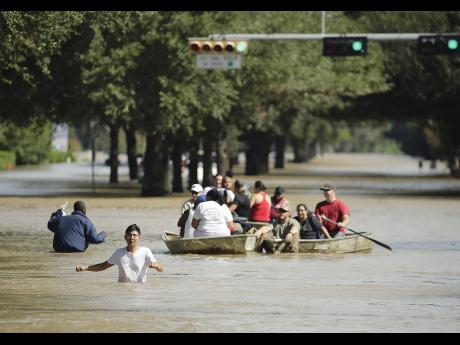Earth Today | Mixed views on likely softening of US climate stance following recent hurricanes
IN THE aftermath of the punishing blows dealt by hurricanes Harvey, Irma and now Maria, local pundits believe the United States (US) could be forced to rethink its stance on climate change.
They, however, stopped short of predicting what that could mean for the US' association with the historic Paris Agreement.
"To me, whether you want to believe in climate change or not, you need to believe in what is happening. Something is happening in our weather system and we have to do what is necessary to protect life and enterprise," said Eleanor Jones, head of the consultancy firm Environmental Solutions Limited (ESL).
She was referencing the lives lost and billions of dollars in damage in sections of the Caribbean but also, notably, in the US states of Texas and Florida caused by hurricanes Harvey and Irma.
Hurricane Maria has since come along to dole out her own punishment, affecting, in particular, Dominica as well as Puerto Rico.
They come in the wake of US President Donald Trump earlier this year signalling a retreat from the hard-fought-for Paris deal struck in 2015 and which was years in the making.
It aims "to strengthen the global response to the threat of climate change, in the context of sustainable development and efforts to eradicate poverty".
This by, among other things, "holding the increase in the global average temperature to well below two degrees Celsius above pre-industrial levels and pursuing efforts to limit the temperature increase to 1.5 degrees Celsius above pre-industrial levels, recognising that this would significantly reduce the risks and impacts of climate change".
EXTREME WEATHER EVENTS
Included among the threats are extreme weather events, such as hurricanes with the strength of Harvey, Irma and Maria.
For scientist Professor Michael Taylor, these events signal the beginning of a "regime of extreme", and call for a comprehensive response.
"We are not used to dealing with this constant onslaught of extreme, and so we need to think about it carefully," the physicist told The Gleaner last week.
For small-island developing states like Jamaica, and others impacted by the recent hurricanes, including Dominica and Antigua and Barbuda, Taylor said it may be necessary to push harder for adaptation financing as well as compensation for loss and damage at the level of the global climate talks to be held this year in Bonn, Germany.
Jones sees no other way, not if vulnerable countries are to effectively weather the storms. And the hell recently visited on the US, she believes, should give the administration pause.
"It should, because what they show is that you must invest in protection of lives, livelihoods and property. He (President Trump) has pulled a lot of the money from that. Hopefully, they will see the value of re-investing. Environmental protection is there for a reason. It has come about because of all we have learnt over the years; it is not pulled from a hat. And learning lessons is a part of human survival," the ESL boss said.
Hugh Dixon, head of the Southern Trelawny Environmental Agency, was of a similar mind.
"I believe there is going to be some adjustment. However, it is not going to come in a way that embarrasses the president. It is likely to be done in a way that looks like it is a new strategy being employed to address something. But I would think that there is not going to be much room for spin-doctoring," he said.
"It is interesting times, but I think there has to be a change in strategy that the US will take," Dixon added.
Independent blogger and environmental activist Emma Lewis was not optimistic.
"The president will not want to lose face by publicly appearing indecisive," she said.
"A Trump adviser said in a statement at the UN that the US will not withdraw [from its position on the Paris Agreement] unless terms are favourable to the US, and it seems unlikely the international community has any stomach for a renegotiation," she added.
According to Lewis, "The US has isolated itself on climate change.
"The US has gone from being a champion on the fight against climate change and inspiring other nations to being totally isolated because of a stubborn stance. We must remember, too, that the domestic oil and gas lobby and coal interests in the US are wielding great influence," she noted.



